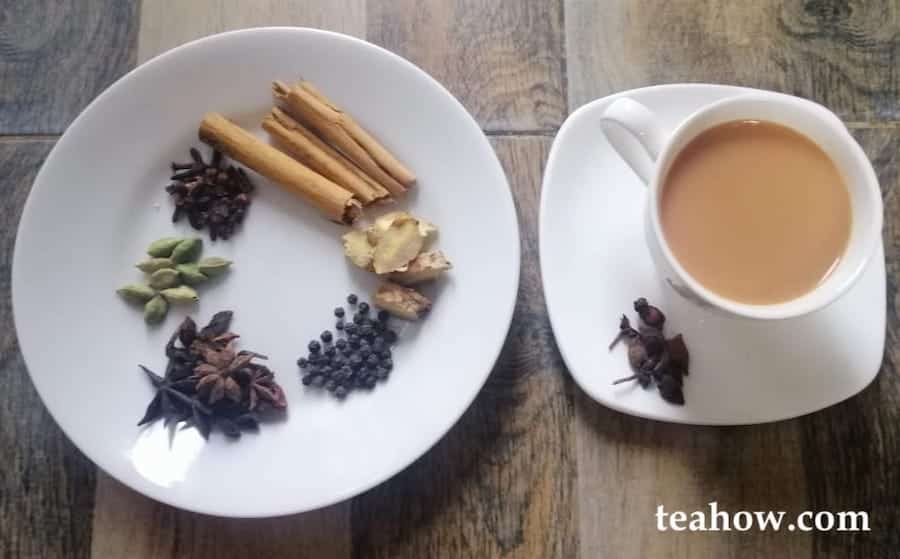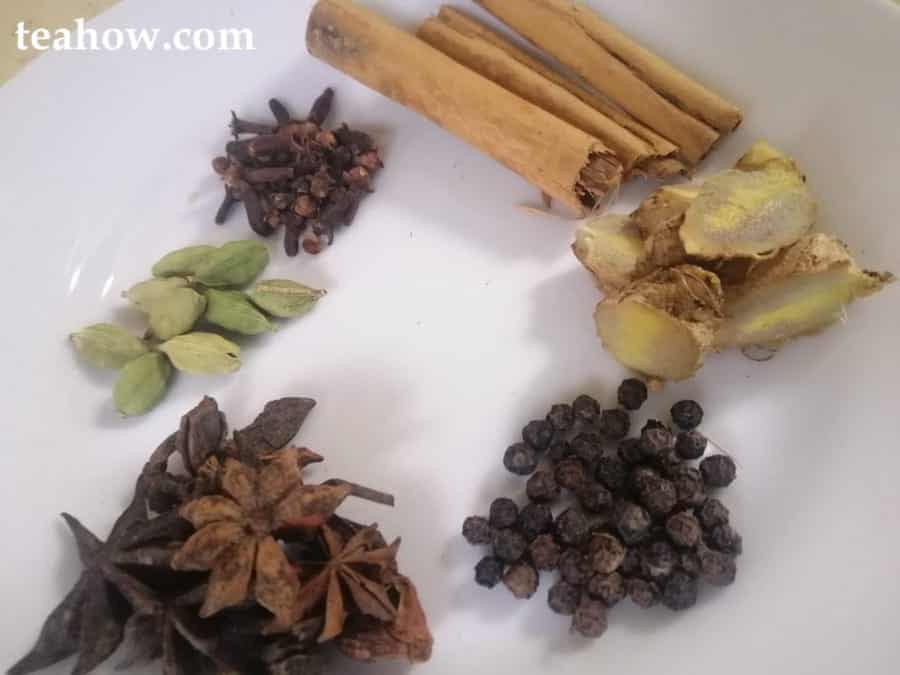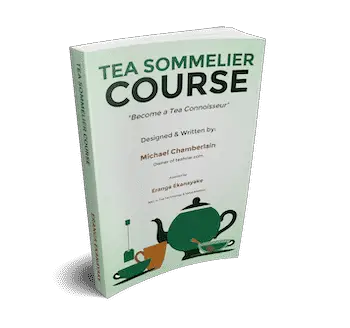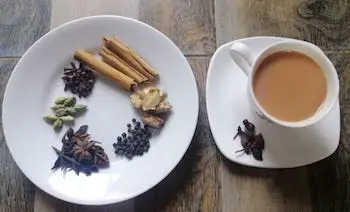Concerned about your caffeine levels perhaps? Or just asking the question does Chai have caffeine? It’s nothing new, many of us like coffee for this exact reason, we know it’s packed with caffeine – but what about Chai?
Here, I’ve outlined the caffeine content in Chai, as well as how this changes based on other Chai varieties – because they do differ…
A traditional cup of Chai made using black tea on average has 50-120 mg of caffeine per cup (8 oz). Green Chai tea has less caffeine. Chai latte with flavored Chai syrup has no caffeine, whereas Chai made using Chai powder or concentrates has 25-55 mg and 30-35 mg of caffeine respectively.
Chai tea also known as masala Chai originates from “India”. Traditionally it’s strong black milk tea with a blend of spices.
So an authentic traditional Chai, with its black tea base contains caffeine and has a unique taste altogether.
Does Chai Have Caffeine
Nowadays chai has reached popularity all across the world. As a result, there are numerous versions and innovations borne out of the traditional recipe. You can read all about the benefits of Chai here.
So giving an exact figure on the caffeine content in Chai can be misleading …as it changes depending on the variety, how it’s made, and other factors.
Below is a general guide on the caffeine content in the different varieties. Starting with an outline table.
| Chai Variety | Caffeine per 8 oz |
|---|---|
| Traditional Chai (Black) | 50 – 120 mg |
| Chai Latte (flavored syrup) | 0 mg |
| Chai Green Tea | 30 – 50 mg |
| Chai with Chai Powder | 25 – 55 mg |
| Chai with Chai Concentrate | 30 – 35 mg |
| Herbal Chai | 0 mg |
Traditional Chai caffeine content
A traditional 8 oz cup of Chai made using black tea, milk, and sugar has on average 50-100 mg of caffeine.
This can vary based on many factors including different brewing methods and quantities of tea used. Some also believe that a traditional cup of Chai can have levels similar to a generic cup of black tea.
A generic cup of black tea (8 oz) on average has around 50 mg of caffeine.
Caffeine in Chai vs Coffee
People often drink coffee in the morning, but Chai tea is also a great morning tea, that’s why it’s made it onto my 20 best morning teas. It has the right amount of caffeine to provide that morning caffeine kick that many seek from a cup of coffee.
In truth, Chai is the usual beverage that many Indians drink to start the day, instead of coffee. But it’s also a means for people to reduce their caffeine intake and still get that rush of energy.
Unlike coffee, Chai latte is made with tea. This reduces caffeine content by more than half. This significantly reduces the experience of post coffee jitters and the caffeine high and low coffee drinkers experience.
On average, a regular 8 oz cup of Chai contains 60mg of caffeine, compared with 120mg for an 8 oz cup of coffee. With a ratio of 2:1, you can drink two cups of Chai for every cup of coffee. This ratio can vary up based on the type of base tea, the quantity of tea, and steep time.
Unlike coffee, the spices in Chai interact with the tannin content of tea – especially black tea – to further slow the absorption of caffeine. Tannin is known to help ease and calm the nervous system.
Because of this, Chai helps you to get a sufficient morning boost, but also enables you to remain calm, level-headed, and focused …without the hyperactive side effects that caffeine often comes with.

The caffeine content in other Chai varieties
There are plenty of variations with Chai tea these days. Most of these variations come with the tea base. Depending on the “tea base” used, the caffeine content can vary.
Chai green tea
Chai green tea is a lower caffeine version of Chai. A generic cup of green tea has 30-50 mg of caffeine, this is less than black tea.
So a Chai green tea can generally contain less caffeine than a traditional cup of Chai.
Chai herbal teas
Herbal teas based on Chai are a more recent trend. This is where herbal bases such as rooibos, turmeric, and ginger are used as the base instead of true tea varieties that contain caffeine.
These herbal tea-based Chai’s make it caffeine-free.
However, such herbal Chai varieties may not give the expected flavor of Chai …but it is a healthier option.
See also, does Chai break a fast.
Chai latte
Chai latte is another version of Chai. Although this is similar to the traditional cup of Chai, it has some additional ingredients added, mostly in the form of additional herbs.
And so, it makes the caffeine content in Chai latte different – based on how it’s prepared.

Most Chai lattes are made using a Chai-flavored syrup that’s mixed with steamed milk. If the latte is made like this, then it is caffeine-free – because the syrup is only an artificial Chai flavor. Such Chai lattes are, in fact, only flavored milk and not tea.
On the other hand, if Chai lattes use powders or concentrate, then they will contain caffeine.
Using Chai powder for lattes will add around 25-55mg of caffeine. Whereas using Chai concentrates for Chai lattes will offer around 30-35 mg of caffeine. This again will vary depending on other factors.
So the key to identifying if your Chai latte variety contains caffeine is to assume it does have caffeine – unless it states otherwise.
Here’s a Chai powder on Amazon if you want to try Chai in powder form.
This is Chai concentrate for those looking to try this method.
You could also check out my article on how to make tea with milk powder.
Decaf chai
As the name suggests, decaf is an option for those who love Chai but are conscious of its high caffeine content.
But decaf doesn’t necessarily mean it’s free from caffeine. In general decaf, beverages can contain 0.4% or less caffeine per cup and still manage to retain most of the original flavor.
Nowadays there are plenty of decaf Chai varieties you can opt for.
More Chai varieties and their caffeine levels…
Starbucks chai caffeine levels
Both Starbucks hot and iced chai tea lattes are made with chai tea concentrate. A Starbucks Grande (16 fl oz) contains 95 mg of caffeine. Alternatively, to get the flavor of chai but less caffeine, opt for a hot brewed chai tea made with 2x teabags in a 16 fl oz version at only 40 mg of caffeine.
Vanilla chai caffeine levels
Vanilla Chai is a black tea base flavored with vanilla extract. Therefore it contains around 40 – 50 mg of caffeine per 8 fl oz cup. This level may vary depending on how it is made or where it is purchased. The vanilla extract has no bearing on the caffeine level of this chai version.
Iced Chai latte contains caffeine
Iced Chai and Iced chai latte are made using a black tea base and therefore the ice has no bearing on the caffeine level. The caffeine level is around 95 mg per 16 fl oz cup. This may vary depending on how it’s made or where it’s purchased. As a guide, a Starbucks Iced Latte is 95 mg.
Twinings chai tea caffeine level
As Twining’s cold brew (Iced) tea is made from a standard black tea base, it will on average contain around 40 mg of caffeine per 8 fl oz cup. The caffeine level may vary based on how strong it is made and other factors.
Factors that affect the caffeine content
All of the above-mentioned varieties are based on an average, but caffeine levels can vary a lot depending on the following factors:
- How much tea you add when brewing Chai.
- If using tea bags, then how much caffeine the tea bags hold.
- What Chai base you use. Green tea base has less caffeine than black. Herbal tea bases are caffeine-free. Decaf is almost caffeine-free but gives the same flavor as a traditional Chai.
- Steeping time, the longer you steep, the greater the caffeine content.
- The quality of actual tea varieties you use as the base. High-quality black tea can have high caffeine levels, whereas high-quality green tea can have less caffeine.
- Cultivation, processing, fermenting and other stages of tea production. All these processes affect how much an actual tea base you use for your Chai tea holds.
If you’re looking at this topic, then you might be interested in elevating your tea skills. In which case my Tea Sommelier course would be perfect for you, enabling you to quickly gain tea skills and become the tea connoisseur you’ve been wanting to be for a long time!

Take the fast track and become a tea connoisseur
Whether for enjoyment or considering a career as a tea sommelier. This course has everything you need to enhance your tea knowledge and tea-tasting skills.
This course keeps it simple with step-by-step tea tasting and easy reference guides
For pleasure, or as a precursor to a career in the tea industry. Find out what tea sommelier actually does, their career paths, and what they earn.

Find out more about the Teahow Tea Sommelier Course!
Find out more about the Teahow Tea Sommelier Course!
You might also be interested in caffeine in other forms of tea, here’s a selection below…
Is there caffeine in Ceylon tea
To finish
I hope this now means you’re informed enough on this question to know what choices to make for your preferred caffeine levels. And don’t forget to check out my Tea Course.
